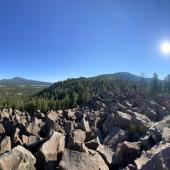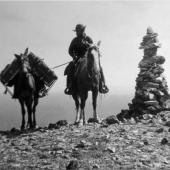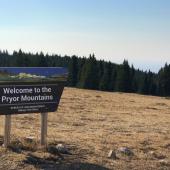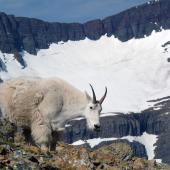Montana in 30 Years - Climate Change
Answers by Professor Steve Running

Okay, let’s start with the obvious. Will we still have snow?
Yes, we will still have snow. However, the spring melt will start a week or two earlier, and we will see more mid-winter valley rain events.
Moisture in Montana is largely dependent on snow pack. How will spring runoff and summer fishing be affected?
Because spring snowmelt is starting earlier and snowmelt completed earlier, we will see late summer streamflows decline. This trend is already happening. On dry years, we will see more potential for small streams to dry up in late summer.
Will we need air conditioning in our homes and businesses?
We are blessed with low humidity and cool nights in Montana, so in most cases we can avoid a lot of air conditioning. Home and building designs can maximize night air circulation to cool down the house; closing and shading windows during the day can be very effective in Montana.
Weather is not climate. What kind of changes are we likely to see in the weather?
We will see less extremely cold winter weather, -30 and -40 degrees, and more summer heat records. It does not appear that precipitation is changing much overall in Montana. We still of course will have wet years and drought years, and the dry years will be tough to get through.
I know I’m not going to like this answer, but tell me what we can expect in wildfire outbreaks.
The fire season is getting longer, starting earlier in the spring, and lasting later into the fall. In 30 years, it will probably be a couple of weeks longer than today, and the regularity of bad fire years will continue increasing. The potential for a truly massive and catastrophic wildfire will continue to build.
Talk to us about wildlife. Which will be affected the most, and which the least?
The good news is that the large winterkills in the past of ungulates, elk, deer, antelope are declining. The biggest risk is probably our fish populations from low, late summer streamflows.
What happens to our forests? I imagine insects will be a bigger problem for our trees.
We are now living through major insect epidemics and forest mortality. Some of the forests dying now will be replaced by shrublands and more drought tolerant ecosystems. Other forests will change species as they regrow.
Montana is a major coal exporter. Aren’t we really contributing to the problem?
Burning coal is the single largest carbon emission source world-wide, and is the single greatest cause of global warming. The first thing humanity should do everywhere to slow climate change is quit burning coal for electric power.
How will Montana “look different?” What will be the most obvious effects of climate change?
The biggest visible changes may be a slow replacement of some forest cover with shrubs and grasslands, and the more common sight of empty stream channels.
As this is a global problem, I wouldn’t imagine there is much we can do to mitigate the worst effects of climate change. Is there really anything we can do to help preserve the things we love about Montana?
The United States loves to lead the world in most everything….except curiously in climate change policy. The rest of the world is waiting for serious leadership by the USA in crafting reductions in carbon emissions. If we would show some true leadership internationally on carbon emission reduction, I think you would be amazed how fast other nations would sign on.
We have two world-class park systems, Yellowstone and Glacier. What will likely happen to these eco-systems?
For these parks, the slow decline in winter snowpack will be the most obvious change.
Can we leave the interview on a positive note? Is there any “good” in store for Montana due to climate change?
I would still rather spend the next 30 years in Montana then most any other state. Montana will still be very nice most of the time. And we don’t have to fix this problem overnight; we really have decades to build our solution. We as Montanans, Americans, and global citizens just have to get started on a serious pathway to decarbonizing energy or our grandchildren will not be able to say the same thing.
Read more: Steve's FIVE stages of climate grief...












Leave a Comment Here